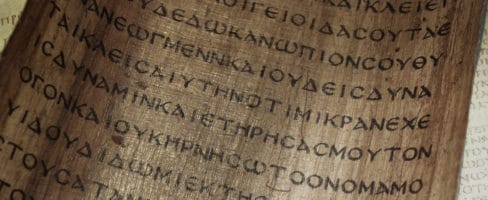Podcast: Play in new window | Download
Subscribe: RSS

Has the Bible Been Miscopied or Mistranslated?
Many people today make the claim that the Bible has been revised, edited, and miscopied over the centuries, and that the translations we have with us today are not at all faithful to the original manuscripts. But is this really the case?
 On this program, Michael Horton discusses this important issue with New Testament scholar Daniel Wallace, editor of Revisiting the Corruption of the New Testament and contributor to The Reliability of the New Testament: Bart Ehrman and Daniel Wallace in Dialogue. Join us for this edition of the White Horse Inn.
On this program, Michael Horton discusses this important issue with New Testament scholar Daniel Wallace, editor of Revisiting the Corruption of the New Testament and contributor to The Reliability of the New Testament: Bart Ehrman and Daniel Wallace in Dialogue. Join us for this edition of the White Horse Inn.
Guest Quote:
“Multiple translations don’t make a text more or less reliable. But it’s interesting that there’s kind of an underlying assumption when people make that statement and it feels something like this: well, the Bible has been translated and once it got translated, people have revised the translation without going back to look at those early manuscripts. And so, I thought that when I was in junior high school but I got past that relatively early. The reality is that the King James Bible, when it was translated in 1611, it was essentially based on the New Testament was essentially based on seven Greek New Testament manuscripts, the earliest of which went back to the 11th century. We still have those manuscripts and we have almost 6,000 more manuscripts. So, we have almost a thousand times as many manuscripts as the King James New Testament was based on and our earliest don’t go back to the 11th century but so far as what’s been published, they go back to the second century. So they go back almost a thousand years earlier. So as time goes on, we’re not actually getting farther and farther away from the original text, we’re getting closer and closer.” – Daniel Wallace
Term to Learn:
“Apostolic Inspiration”
The operation of the Holy Spirit after the day of Pentecost differed from that which the prophets in their official capacity enjoyed. The Holy Spirit came upon the prophets as a supernatural power and worked upon them from without. His action on them was frequently repeated but was not continuous. The distinction between His activity and the mental activity of the prophets themselves was made to stand out rather clearly. On the day of Pentecost, however, He took up His abode in the hearts of the apostles and began to work upon them from within. Since He made their hearts His permanent abode, His action on them was no more intermittent but continuous, but even in their case the supernatural work of inspiration was limited to those occasions on which they served as organs of revelation. But because of the more inward character of all the Spirit’s work, the distinction between His ordinary and His extraordinary work was not so perceptible. The supernatural does not stand out as clearly in the case of the apostles as it did in the case of the prophets. Notwithstanding this fact, however, the New Testament contains several significant indications of the fact that the apostles were inspired in their positive oral teachings. Christ solemnly promised them the Holy Spirit in their teaching and preaching (Matt. 10:19, 20; Mark 13:11; Luke 12:11, 12; 21:14, 15; John 14:26; 15:26; 16:13). In the Acts of the Apostles we are told repeatedly that they taught “being full of,” or “filled with” the Holy Spirit. Moreover, it appears from the Epistles that in teaching the churches they conceived of their word as being in very deed the word of God, and therefore as authoritative (1 Cor. 2:4, 13; 1 Thess. 2:13). (Louis Berkhof, Systematic Theology, p. 148)
(This podcast is by White Horse Inn. Discovered by Christian Podcast Central and our community — copyright is owned by the publisher, not Christian Podcast Central, and audio is streamed directly from their servers.)